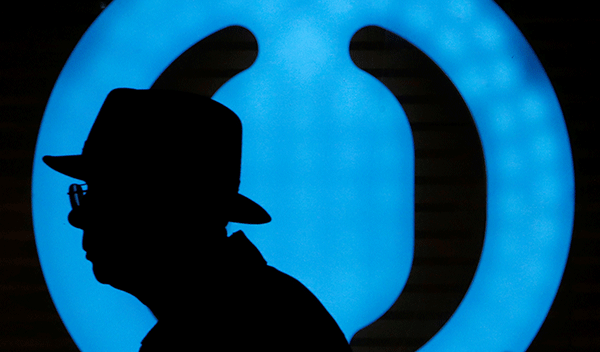 |
| A man walks past the logo of Russian bank Otkritie in Moscow |
Russia’s central bank is facing criticism for failing to prevent an aggressive expansion drive by private sector lender Otkritie that led to the biggest bank bailout in the country’s history.
Otkritie was taken over by the central bank of Russia (CBR) on August 29 after a run on deposits prompted shareholders, which include the state-controlled bank VTB, as well as a clutch of local oligarchs, to request state support.
The CBR, which is now the majority owner of Otkritie, will run the bank for a year before appointing new management ahead of a potential sale to new owners. A detailed analysis of Otkritie’s balance sheet has been initiated, which is expected to take six to eight months.
Bankers and investors praised the bailout for stabilizing prices of Russian bank bonds and calming fears of market contagion. At the same time, some wondered whether it could have been avoided if the CBR had taken a tougher line during Otkritie’s break-neck, debt-funded expansion.
Growth
A small brokerage at the time of the financial crisis, Otkritie had grown to become Russia’s largest private sector lender by the start of this year. The group’s first big acquisition came in 2012, when it paid $2 billion for Nomos Bank, at the time the eighth largest in Russia by total assets.
Subsequent purchases included Trust Bank, Lukoil’s diamond mining subsidiary and a group of private pension funds. Otkritie also doubled its balance sheet in late 2014 when it helped sanctioned Russian oil giant Rosneft refinance $7 billion of hard currency debt by buying R625 billion ($10.8 billion) of its bonds and using them as collateral for a reverse repo with the CBR.
The bank also used cheap liquidity provided by the CBR to snap up more than $7 billion of Russia’s 2030 Eurobond at low rates in the wake of the oil price collapse and rouble crash, a trade that proved extremely lucrative when asset prices recovered.
“Otkritie basically had a hedge fund business model – use cheap borrowed funds and buy everything you can get your hands on,” says a Moscow-based banker.
The group appears to have overreached itself, however, with the purchase of Russia’s biggest insurer Rosgosstrakh. Long before the acquisition was approved in August, Otkritie had committed R40 billion to recapitalize the firm, which made a heavy loss in 2016 and again in the first half of this year.
In early July concerns about the pace of Otkritie’s expansion and weaknesses in its loan portfolio prompted Russia’s new domestic rating agency, Acra, to assign the bank a BBB- rating. This was one notch below the level required for banks holding deposits of Russian state-owned corporates and private pension funds, sparking fears of heavy outflows.
 |
| Alexander Danilov, Fitch Ratings |
Other depositors therefore began to pull cash from Otkritie. In June and July the bank lost 26% of its client deposits, or R433 billion, according to Acra. Otkritie’s senior and subordinated Eurobonds also suffered a sharp sell-off.
On August 7 Otkritie’s founder Vadim Belyaev returned as chief executive in a bid to calm market and depositor nerves. By the middle of the month, however, the situation was still deteriorating. Moody’s put the bank on review for downgrade and Acra followed suit.
Shareholders of Otkritie Holding, the majority owner of Bank Otkritie, accepted CBR support in return for ceding 75% of their holdings. Central bank officials have indicated that the remaining equity may be wiped out within three months if Otkritie is found to have a negative capital position.
Holders of the bank’s subordinated bonds may also be bailed in. Analysts agree, however, that senior bondholders will likely be protected.
No indications have yet emerged on the likely scale of a recapitalization for Otkritie, but locals in Moscow say it could be in the range of the $14 billion required to bail out Bank of Moscow in 2011, previously the largest bank rescue in Russia’s history.
“It is legitimate to ask how a local systemically important financial institution could grow so rapidly with such a shaky foundation,” says Gunter Deuber, head of central and eastern European research at Raiffeisen Bank International.
Alexander Danilov, a bank analyst at Fitch Ratings, notes that Otkritie’s acquisition drive was partly sponsored and financed by the CBR itself as part of a broader strategy of encouraging larger banks to take over failing lenders following the bursting of Russia’s consumer finance bubble in 2013.
Trust Bank, for example, was initially bailed out by the central bank before being sold to Otkritie. This resulted in a weakening of Otkritie’s balance sheet when Trust Bank proved to have negative equity even after receiving CBR support.
“I think it’s fair to criticize the central bank for not acting sooner on Otkritie,” says Danilov. “They acknowledge that part of the reasons for the bank’s failure was its aggressive, over-leveraged expansion, yet they were the ones who approved some of those transactions.”
Market participants also raised concerns that Otkritie’s bail-out could create moral hazard in the Russian banking sector. “I would be worried about the message it sends to the shareholders of other systemically important private banks,” says a senior Russia banker.
